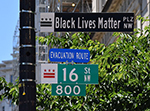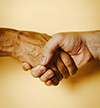

Have you ever made a judgment about a situation and later realized you only knew part of the story? Did learning more details change how you thought about it? This has been happening to me a lot lately as I delve into the history of our country from different perspectives. We're in the midst of a series of articles applying the GAPS model for personal reconciliation to racial reconciliation. This time we're looking at the A in GAPS, which stands for "Admit your part of the conflict." Applying this to racial reconciliation, this means telling the whole truth about our history as a country. As I noted in the first article, this step requires white people like me to do the heavy lifting because we have inflicted most of the damage in the relationship.

In our last newsletter, we looked at Pastor Scott Dudley's model for personal reconciliation, GAPS, and we applied it to racial reconciliation. Today, let's flesh out that first step. The G in GAPS stands for "Go to the person you're in conflict with." In the context of racial reconciliation, this means we need to be in relationship with people of races and ethnicities different from our own. Let's look first at why this is important and then at how to do it.
In the first session of our Justice, Kindness, and Humility Bible Study, our speaker calls up an image from Handel's Messiah that I think is fitting to reflect on as we prepare for Holy Week. In teaching us about a biblical theology of justice, the Rev. Dr. Gabriel Salguero refers to the movement "Ev'ry valley shall be exalted," which in turn quotes Isaiah 40:3-4: "A voice of one calling: 'In the wilderness prepare the way for the Lord; make straight in the desert a highway for our God. Every valley shall be raised up, every mountain and hill made low; the rough ground shall become level, the rugged places a plain.'"
What do you see when you look out the window? What do you see when you look in the mirror? I first learned to think about these questions in a new way at the Frames and Filters workshop led by Tali Hairston. (This concept was first introduced by Emily Style for the National SEED Project.) Tali explained that when I look in the mirror, I see myself reflected back. When I look through a window, I see how others experience the world.
As a member of the dominant culture (white, native-born American), when I look at movies, magazines, TV, and books, I'm usually looking into a mirror. I get to see my own experiences reflected back a lot. Seeing yourself reflected in the world around you is great for building identity and self-worth. But what if you're not part of the dominant culture? Too often, you're looking through windows and seeing the experiences of others. This is great for building empathy and learning about others, but it is isolating when you rarely see yourself reflected. The truth is, we need both windows and mirrors in our lives.
When we work together to seek racial justice and healing and reconciliation, we often encounter stories of struggle and suffering. We turn on the tv or open the newspaper and we mourn for the vulnerable and the marginalized: refugees fleeing their homelands and seeking shelter in camps or new countries, children separated from their parents as their families seek asylum, unarmed young black men being shot, victims of mass shootings targeted because of their ethnicity or religion. What do we do with the heartbreak we feel when we encounter these stories? The place to start is with lament. But what does it mean to lament?
In his book, Prophetic Lament: A Call for Justice in Troubled Times, Dr. Soong-Chan Rah examines in detail the most famous lament in the Bible. The book of Lamentations is a response to the suffering of the people of Jerusalem after their city has been destroyed and most of its inhabitants have been taken away into exile. Over the course of his analysis, Dr. Rah outlines many facets of lament.
Page 2 of 2